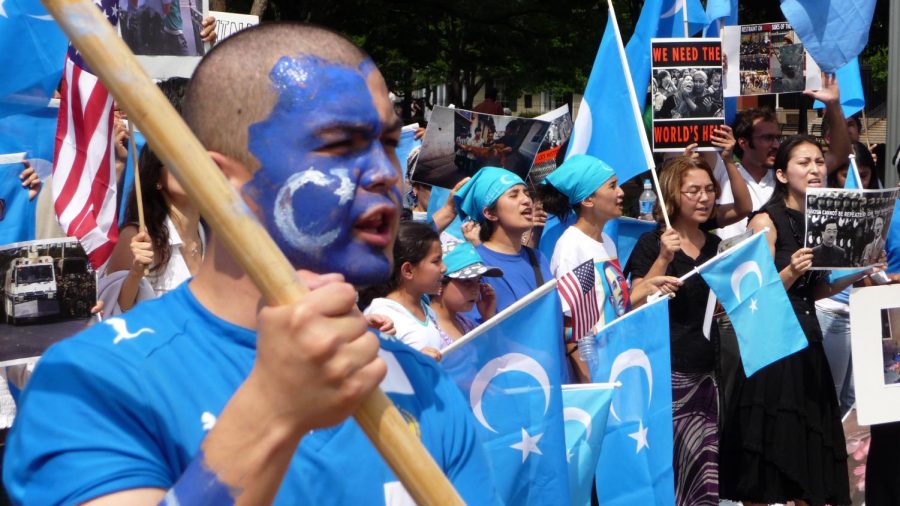Uighur Muslims Face Severe Oppression in China
Opinion
Malcolm Brown
Protesters hold a rally outside the White House against China’s treatment of Uighurs on July 10, 2009. Five days earlier, hundreds of Uighurs led riots in Xinjiang, China that quickly escalated into violence.
January 16, 2020
Near the end of 2018, the detainment and abuse of millions of Uighur Muslims came to light. In the region of Xinjiang, China, Uighurs are facing major oppression in “vocational education and training centers.” As a result of the Chinese government refusing to share information about the camps, the oppression had remained hidden for years. Only recently has China admitted to the existence of the camps, but it continues to conceal their true nature from the rest of the world.
Since April 2017, 800,000 to 2 million Uighurs and other Muslims, such as ethnic Kazakhs and Uzbeks, have been detained. Experts estimate these camps have existed since 2014 and tripled in size from 2017 to 2018.
International rights organizations have successfully uncovered some of the abuse tactics used in these camps. Muslims who fled the detainment camps recounted that they were forced to pledge loyalty to the Chinese Community Party, sing Communist songs, and learn Mandarin. Others recalled sleep deprivation during interrogations, torture, and prison-like conditions with cameras and microphones everywhere. In addition, women have described being subjected to sexual abuse, being forced to have abortions, and having contraceptive devices implanted against their will.
Oppression is not limited to inside the camps. Outside, historic mosques are being destroyed, women are warned against wearing hijabs, and Muslim children are being put into orphanages. Along with this, the Xinjiang government has been actively engaging in an anti-halal campaign..
China has continued to deny all reports and accusations of abuse and mistreatment, claiming that the crackdown is to deter extremism and separatist ideas but that the rights of Uighurs aren’t being violated. Yet not only are they violating the Muslims’ right to freedom of religion, they are also violating their right to privacy. Communist Party members occupy Uighur homes making sure they don’t practice “extremist” behaviors. But what they consider “extremist” behavior includes simply practicing their religion by fasting during Ramadan or praying on Fridays.
The violation of privacy gets worse. In order to facilitate their oppression, the Chinese government split Xinjiang into squares of about 500 people each, with a police department closely monitoring everyone. They use cutting-edge technology to scan people’s faces, constantly check their ID cards, take their photographs and fingerprints, and search their phones.
Multiple human rights organizations, the UN, and the European Union have all voiced their concerns about this oppression, calling on China to shut down the camps and respect the religious freedom of the Uighurs. However, not many Muslim nations have protested in fear of China cutting off economic ties with them. Last year, Turkey became the only Muslim-majority country to speak out against the detainment camps, calling on China to protect the cultural identities of Muslims.
The world knows this oppression needs to come to an end, but it does not know how to help. Countries have discussed various solutions to stop China from targeting Uighurs, such as publicly opposing the Chinese government, sanctioning senior officials, and restricting exports of the technologies that enable this abuse. The international community must now stop wasting time and act on these proposed policies. Rather than continuing to try and negotiate with China or avoid the issue, it needs to condemn China and make it answer for its actions against Uighurs.
Also an important step is for countries like the United States to grant asylum to Uighurs who have fled Xinjiang. The more countries offer asylum, the easier it will be for Uighurs to escape from the injustices they are facing in China.
The mistreatment of someone for practicing their religion is wrong, and no one deserves to undergo what the Uighur Muslims in Xinjiang are going through. Religions give people hope and faith. They teach peace and love and acceptance. They do not teach anger and war and abuse. Regardless of whatever fears China may have of extremism, they have no right to punish innocent people simply for their religious beliefs. The oppression must end.



